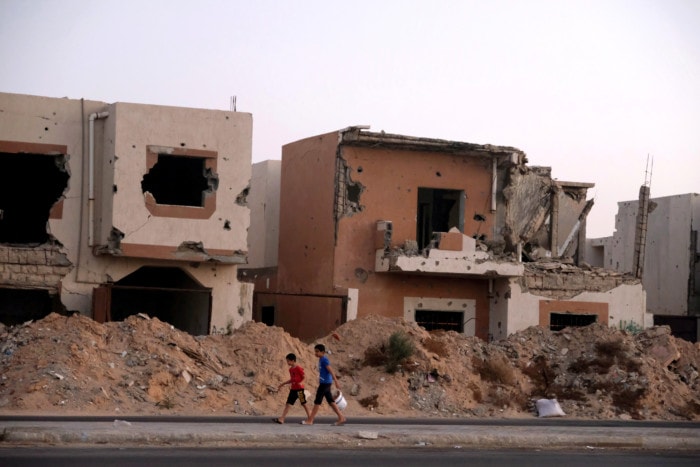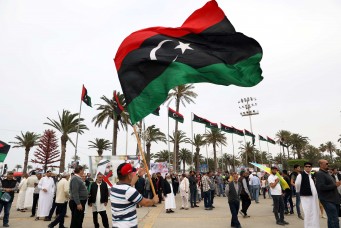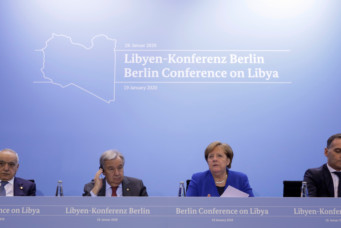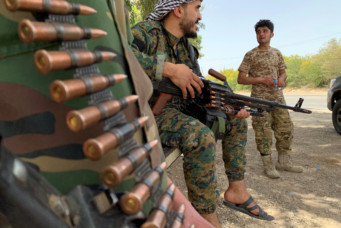Moving Past Libya’s Failures
After years of turmoil, Libyans thirst for unity and an end to the nine-year conflict. What should the making of a settlement in a divided Libya look like?

Boys walk past destroyed houses during past fighting with Islamic State militants in Sirte, Libya, August 17, 2020. Reuters/Esam Omran Al-Fetori
It’s difficult to come to terms with the fact that Libya has been in a state of turmoil, declining living conditions, and civil war for almost a decade. The Libyan conflict is one which has been largely overshadowed in the media and in diplomacy since the reignition of crisis in 2014. Recently, there has been some movement on the diplomatic front to reach a settlement and end the turmoil. However, the conflict is extremely complicated, with several different governments, armies, and militias supported by different outside players, reflecting regional tensions such as those between Egypt and the UAE on one hand and Turkey and Qatar on the other. Despite some media coverage on the recent diplomatic initiatives, the general public’s exposure to information on the matter is limited–which is why having experts and people on the ground that can break down the complicated subject is crucial.
On October 7, Nabil Fahmy, founding dean of the School of Global Affairs and Public Policy at the American University in Cairo and former Egyptian foreign minister, hosted a Tahrir Dialogue webinar titled “Libya: Is a Settlement in the Making?” It was moderated by Ibrahim Awad, director of the Center for Migration and Refugee Studies at AUC, with Libyan politician Mohamed Dayri and AUC’s former president Lisa Anderson as speakers.
Dayri, who was the foreign minister of Libya’s Tobruk-based House of Representatives from 2014 to 2019, paints a rather dismal picture of current life in what Awad describes as a “failed state,” saying that outsiders have little knowledge of what Libyans have grown increasingly frustrated with. Suffering from widespread corruption, deteriorating living conditions, prolonged power blackouts, a worsening pandemic situation, and war fatigue, Libyans took to the streets to protest against corruption, leading to the resignation of the Prime Minister of the Eastern Libyan government, Abdallah Al-Thani, and his cabinet. The rival Government of National Accord’s (GNA) Prime Minister Fayez Al-Sarraj also announced that he would be stepping down by the end of October.
Despite the grim outlook, Awad sees “glimpses of hope,” citing recent talks in Berlin, Bouznika, Montreux, and Hurghada. Dayri explains that the Montreux talks produced a roadmap for a fifth transitional period over eighteen months and designation of a presidential council which ensures equal representation for the country’s three provinces. He continues saying that the Hurghada talks, hosted later in September, got the GNA and Libyan National Army (LNA) to meet and discuss security matters, bringing up the removal of militia, the possibility of unification, and how to secure Sirte, a coastal city contested during the civil war and previously controlled by ISIS. The United Nations Support Mission in Libya has been involved in all the aforementioned initiatives, and Dayri says that UN-led talks should take place soon as well.
Nevertheless, Anderson, who is a special lecturer at Columbia University and the author of The State and Social Transformation in Tunisia and Libya, 1830-1980, is wary of being optimistic for a settlement. She recognizes that there has been more action on the diplomatic front than there has been in a long time, but she makes the important distinction that as more diplomatic efforts fail, the more likely that there would be subsequent efforts that also fail. She points out the “profound skepticism” bordering on cynicism that people have with regards to the efforts of the last nine years to bring them together and laments that “people are almost afraid to be hopeful”. Despite this, Anderson concedes that the fact that the opposing sides are at the same table together is cause for hope.
Many Challenges Lie Ahead
Dayri also recognized the challenges, and presented a number of guidelines to manage the political transitionHe says that the political dialogue may be tied to a tight deadline, referring to Al-Sarraj’s decision to tender his resignation by the end of October, thus putting pressure on the governments and international community to make key decisions before then. Dayri stresses the need to avoid political expediency that may be counter-productive in the long term. Furthermore, he emphasizes the role of inclusivity as a cornerstone to any settlement, citing the trap of 2015, where Article 8 of the Libyan Political Agreement was “designed to exclude the LNA general commander”. This, he says, should be avoided.
The former foreign minister continued to highlight other challenges, saying that it is important for the international community to reach an agreement as well as ensure its effective implementation. This agreement shouldn’t just be a power-sharing deal, like the settlement produced in 2015, but should rather build institutions, introduce economic reforms, and introduce a new constitution that ensures presidential elections by the end of the upcoming transitional period. Dayri points to the lack of nuance in the overused phrase that: “Libyans should be able to agree and settle their problems,” and he reaffirmed the important role of the international community in fostering an agreement on Libya, stressing that the conflict cannot be solved unilaterally. At the moment, he’s afraid that not all stakeholders are “on the same wavelength” and fail to find consensus on the appointment of the new UN special envoy. Dayri rightfully claims that more diplomatic action is needed in order to bring to the fold all those involved in the Libyan crisis.
International Power Play
Of course,action required by international actors is one of a cooperative, constructive nature. Unfortunately, a wide array of international actors are involved in Libya in all the wrong ways. Fahmy criticized the “silliness of big powers”—not being able to reach a consensus regarding the appointment of the UN special envoy and not wanting to lose, yet not wanting to invest enough to gain. Accordingly, Fahmy highlights the important role of Egypt and Turkey in the conflict. Anderson agrees with the general sentiment, describing the big powers’ neglect of Libya as “unbelievably irresponsible,” hoping that a change in the U.S. administration might bring a change to its policy in Libya. She further criticizes the carelessness with which external powers treat Libya, acting as if it’s a “playground” to play out regional and international rivalries. According to Anderson, for every local actor, there’s an “external patron” pulling the strings. This hinders progress not only locally, but also on the level of international forums, even when the discussions are between local actors, as there are always considerations given to the reaction of external patrons.
Other than the feud between Egypt and Turkey, she points to the divisions in the Gulf being played out in Libya, despite neither Qatar nor the United Arab Emirates really being interested in the conflict in Libya. Similarly, she criticizes the behavior of France, Russia, and the United States, and expressed concern that whatever presence the United States has seems designed to counter that of Russia (who supports General Haftar while the GNA has NATO support with the exception of France who is at odds with Turkey).
Anderson believes that changes in the regional and international spheres will be quite helpful in implementing a roadmap in Libya, echoing Dayri’s remarks. Both of them encourage the idea of a detente, an easing of relations between Egypt and Turkey, and between the UAE and Qatar. Anderson suggests that Libya can serve as an experimental ground for warming of relations between regional powers, “calmy agreeing to disagree” rather than escalating the confrontation. Yet that is optimistic as she’s willing to be on the matter, suggesting that agreement on matters of regional tension is unlikely in the short term, and that the manner of disagreement is the realistic target for change. Dayri stresses the importance of finding a leader in the fragmented international community (bilaterally or through mediation from the United States or Russia), as he does not see one right now, despite previous attempts by Italy, France, and Germany.
Domestic Woes
Domestically, the situation is no less complicated, and no less challenging. Dayri indicates the existence of radicals within key stakeholders both in the west and east of Libya, “pushing for a military solution as we speak”. Anderson agrees, adding that there are political opportunists everywhere, with many who stand to lose by any settlement. These spoilers will prove to be troublemakers, and their “entrenched interests” and the violence and corruption that come out of them are a major source of disturbance for any potential movement forward. However, Anderson does see an opportunity for what she calls the “responsible Libyan elite” to make compromises and strive for a sustainable solution, enough to override the ill will of spoilers.
Yet, one must be careful not to overstate the divisions within Libya. Libya’s administration is divided, and that is a crisis that has to be tackled. However, from a geographical perspective, Anderson says that despite Libya being as vast as it is, the notion that the people from the different regions do not know each other is not true. She states that there has been a lot of movement between regions since the second half of the twentieth century, and that the situation in Libya isn’t comparable to the ethnic tension that brought down Yugoslavia, for instance. Dayri agrees, citing mixed marriages and the movement and flow of people, saying there is some semblance of national unity. Awad sees these points as a foundation upon which a settlement can be built. “The foundations are solid,” he exclaims optimistically. However, recent developments since 2014 have created some cracks within the Libyan population, with those in the south and the east feeling marginalized, as oil dividends have mostly gone to the west, according to Dayri. He is of the opinion that Libya “needs to look at decentralizing its political system,” but he stresses that all Libyans are eager to see a united Libya. He dismisses the idea of a split country, a fractured Libya.
“There is a thirst for unity and the end of a conflict that has plagued our country for the last nine years.” Such a notion is easy to get behind. The sooner a solution is found, the more stable, and prosperous, the Middle East, North Africa, and Mediterannean region will become. Failure has been a consistent theme of the past, and it promises to be a dark shadow looming over the future if domestic, regional, and international actors don’t set their priorities straight and put the welfare of the Libyan people above all other considerations. Yet some experts believe there is a way out, as rough and gradual as it may be, and there is hope. There wouldn’t have been much of a discussion otherwise.
Omar Auf is deputy senior editor at the Cairo Review of Global Affairs. He has previously worked and published in independent media organization Mada Masr and as an assistant editor at the Cairo Review.
Auf holds a Master of Global Affairs degree with a regional and international security concentration from the American University in Cairo, and a Bachelor of Arts in economics from Sciences Po Paris.
Read More



